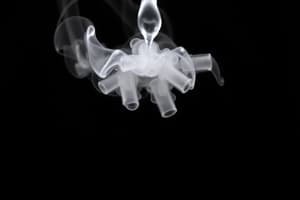Podcast
Questions and Answers
What does Raoult's law state about the boiling point of a solution compared to the boiling point of the pure solvent?
What does Raoult's law state about the boiling point of a solution compared to the boiling point of the pure solvent?
- The boiling point of the solution is equal to the boiling point of the pure solvent
- The boiling point of the solution becomes infinity
- The boiling point of the solution is lower than the boiling point of the pure solvent (correct)
- The boiling point of the solution is higher than the boiling point of the pure solvent
In a solution according to Raoult's law, what happens to the freezing point compared to the freezing point of the pure solvent?
In a solution according to Raoult's law, what happens to the freezing point compared to the freezing point of the pure solvent?
- The freezing point of the solution becomes zero
- The freezing point of the solution is higher than the freezing point of the pure solvent
- The freezing point of the solution is equal to the freezing point of the pure solvent
- The freezing point of the solution is lower than the freezing point of the pure solvent (correct)
According to Raoult's law, how does the vapor pressure of a solvent change when a non-volatile solute is added?
According to Raoult's law, how does the vapor pressure of a solvent change when a non-volatile solute is added?
- The vapor pressure of the solvent remains unchanged
- The vapor pressure of the solvent becomes zero
- The vapor pressure of the solvent decreases (correct)
- The vapor pressure of the solvent increases
Flashcards are hidden until you start studying




